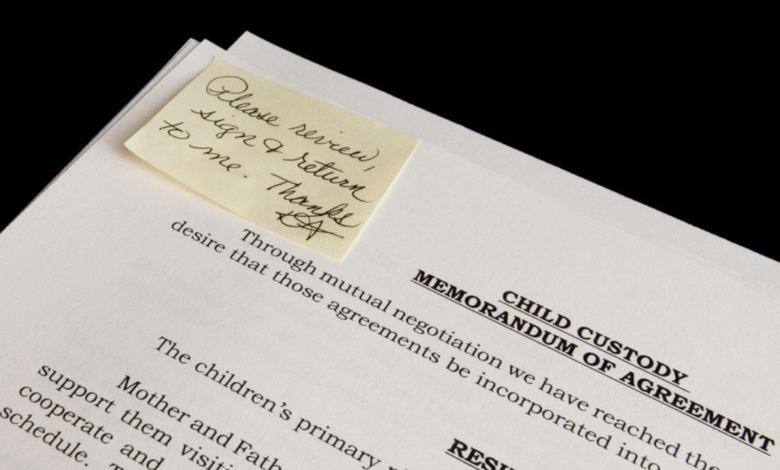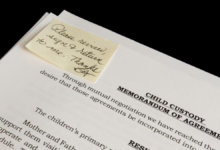What Voids a Custody Agreement?

What Voids a Custody Agreement are an essential part of ensuring that children’s welfare is prioritized when parents part ways. These agreements provide a structure for how both parents will handle matters like visitation, decision-making, and living arrangements. However, there are instances where a custody agreement can become void. In such cases, the established arrangement no longer holds legal weight, and new considerations must be made.
Understanding What Voids a Custody Agreement is crucial for both parents, as well as anyone involved in the care of children following separation or divorce. Whether it’s due to changes in the child’s needs, the actions of the parents, or a legal misstep, there are several reasons why a custody arrangement may no longer be enforceable. In this article, we’ll explore these scenarios in detail, providing clarity on how custody agreements can be voided and the legal implications of these changes.
What is a Custody Agreement?
Before diving into the various ways What Voids a Custody Agreement can become void, it’s important to understand what such an agreement is in the first place. A custody agreement is a legal document that outlines the rights and responsibilities of each parent concerning the care of their child or children. This agreement is typically put in place after a divorce or separation and is designed to ensure that both parents have a say in important matters such as education, healthcare, and general upbringing.
There are generally two types of custody: physical custody, which refers to where the child lives, and legal custody, which grants the parent the right to make decisions regarding the child’s life. Custody arrangements can be negotiated between the parents, but if they can’t reach an agreement, the matter may go to court for a judge to decide.
Understanding What Voids a Custody Agreement
The voiding of What Voids a Custody Agreement refers to the situation where the legal conditions of the agreement are no longer valid or enforceable. A variety of circumstances can lead to this outcome, including changes in the law, alterations in the family situation, or the discovery of new information that makes the existing custody arrangement untenable.
In some cases, What Voids a Custody Agreement may involve one parent failing to comply with the terms of the agreement, while in others, it might be due to a material change in circumstances that renders the current agreement unsuitable for the child’s best interests. Understanding what can void a custody agreement is essential for parents to ensure they are abiding by the law and that their custody arrangements remain in the best interest of their child.
Legal Missteps in Creating the Custody Agreement
What Voids a Custody Agreement can be voided if it was created improperly or if it doesn’t meet the legal standards set by the state or jurisdiction in which it was made. For example, if one parent was coerced or forced into agreeing to the terms of the custody arrangement, the court may consider the agreement invalid. Similarly, if the agreement wasn’t signed in front of the appropriate witnesses or notarized when required, it may not be legally binding.
In addition to procedural errors, if the agreement was made under fraudulent circumstances — such as one parent providing false information about their situation or the child’s needs — the agreement may be voided. Courts take these issues seriously, as they are concerned with protecting the child’s well-being and ensuring that all parties involved act in good faith.
When a Child’s Best Interests Change
What Voids a Custody Agreement are typically designed with the child’s best interests in mind. However, what happens when the child’s needs or circumstances change? A custody agreement might be voided if it is determined that the existing arrangement no longer serves the best interests of the child. This can happen if the child develops a need for special care or if the parent-child relationship evolves in a way that requires adjustments to the custody arrangement.
For example, if a child becomes ill or develops a disability that requires more intensive care than previously thought, What Voids a Custody Agreement might need to be updated to reflect these new needs. Similarly, as children grow older, they may express a preference for living with one parent over the other, which can lead to a modification of the original agreement. The court will always prioritize the child’s needs and well-being when determining whether an agreement should be voided or modified.
When One Parent Violates the Terms of the Agreement
One of the most common reasons What Voids a Custody Agreement might become void is when one parent violates the terms set out in the agreement. These violations can range from minor infractions, such as not adhering to the agreed visitation schedule, to more serious breaches, like neglecting the child’s well-being or engaging in criminal activity that puts the child at risk.
If a parent fails to follow the terms of the agreement, the other parent can petition the court to have the agreement voided or modified. In some cases, the court may find that the non-compliant parent’s actions have caused harm to the child, and in such instances, the court might void the existing custody arrangement to protect the child’s best interests.
Substance Abuse Issues
Substance abuse is another serious concern that can What Voids a Custody Agreement. If one parent is found to be abusing drugs or alcohol, this can have a detrimental effect on their ability to care for the child, potentially rendering them unfit for custody. In such situations, the other parent may petition the court to have the custody agreement revised or voided altogether.
Courts take substance abuse issues very seriously, as they can significantly impact the safety and stability of the child’s living situation. If there is evidence that one parent’s substance abuse is interfering with their ability to provide a safe environment for the child, the court will likely modify the agreement to protect the child’s welfare.
Domestic Violence and Abuse
Domestic violence or abuse is a grave issue that can void a custody agreement. If there is evidence that one parent is engaging in abusive behavior, whether it’s physical, emotional, or psychological, this can lead to the What Voids a Custody Agreement being voided. In cases where there is a history of domestic violence, the court may even deny one parent access to the child altogether, depending on the severity of the abuse.
The safety of the child and the non-abusive parent is the primary concern in cases involving domestic violence. A history of abuse can lead to a complete reevaluation of the custody agreement to ensure that the child is not exposed to harm.
Court Decisions and Modifications
In certain circumstances, the court may decide to void or modifyWhat Voids a Custody Agreement due to changes in the law or a shift in societal norms. This can happen if the legal landscape regarding custody laws changes or if new evidence comes to light that suggests the current agreement is no longer appropriate.
Courts have the authority to review and adjust custody arrangements as necessary. Even after What Voids a Custody Agreement is finalized, either parent can request a modification if they believe the current terms are no longer valid or effective. However, the court will only make such modifications if they are in the best interests of the child.
Changes in Family Dynamics
Changes in the family dynamic can also contribute to the voiding of What Voids a Custody Agreement. If one parent remarries or relocates to a different state, this can create a situation where the current custody arrangement no longer works. Similarly, if there is a significant change in the child’s life, such as the death of a parent or a major life transition, the court may reevaluate the terms of the agreement to ensure it is still serving the best interests of the child.
These changes in family circumstances are often a central consideration for the court when deciding whether to void or adjust What Voids a Custody Agreement. The aim is always to ensure that the child is placed in the most stable and supportive environment possible.
